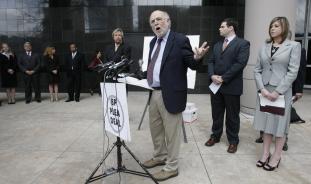Victims decry BP plea deal
Judge delays ruling in the case after families have their sayBy KRISTEN HAYS
Copyright 2008 Houston Chronicle
Feb. 5, 2008
JULIO CORTEZ: CHRONICLE

JULIO CORTEZ: CHRONICLE
Top: Eva Rowe's parents were killed in the BP Texas City refinery blast. "I will never forget seeing my father's blood-soaked face with the lines running from his eyes down his cheeks from the tears that he cried before he died," she said.
Bottom: Craig McDonald, executive director of Texans for Public Justice, talks to members of
the news media on Monday.
Nearly three years after Ralph Dean dug his injured wife, Alisa, from the rubble of the 2005 blast that killed 15 people at BP's Texas City refinery, he still can't talk about it without breaking down.
So he stood silent before U.S. District Judge Lee Rosenthal on Monday as his lawyer read his account of what the Deans endured.
"The world turned to smoke and flames," attorney Edward Mallet read, having already noted that Alisa Dean and her father, Larry Thomas, were working in a trailer 121 feet away when the blast obliterated the flimsy building. Alisa Dean survived, but her father was among the 15 people killed by the blast.
Ralph Dean's account was among several from blast victims who appeared before Rosenthal on Monday in an effort to persuade her to reject a plea deal between the U.S. Justice Department and BP's division that oversees its U.S. refineries.
Keith Casey, who has been the manager of the Texas City plant for about a year, pleaded guilty on behalf of the company.
"Our guilty plea is an admission that we failed to meet our own standards and the requirements of the law. The result was a terrible tragedy that could have been avoided," Casey told the judge.
Rosenthal delayed a ruling to allow plaintiffs' attorneys and prosecutors to submit filings on complicated legal issues that dominated several hours of arguments after the victims had their say. The judge didn't set a date for another hearing.
She said the company can withdraw its guilty plea if she rejects the agreement.
The proposed deal - which includes a guilty plea to a felony environmental crime, a $50 million fine and three years' probation - has drawn the ire of victims and their lawyers, who say it's too lenient for a tragedy that caused such carnage.
BP and federal prosecutors counter that it's harsh enough because it requires BP's North American products division to become a felon and $50 million would be the highest fine ever assessed under the Clean Air Act.
That stance gave little comfort to those who implored the judge on Monday to see the deal through their eyes.
"My mother had to be identified by DNA because there was not much of her left. She had been severely burned and decapitated during the blast," said Eva Rowe, whose parents, James and Linda Rowe, were among those killed.
"I will never forget seeing my father's blood-soaked face with the lines running from his eyes down his cheeks from the tears that he cried before he died. I often wonder what he was thinking at that moment," she said.
Dean's statement said he felt the blast when running a forklift about 100 yards away. He dug into the rubble where the trailer once stood, desperate to find his wife and father-in-law.
He found Thomas' body first. Then he fished his unconscious wife out from under a bookcase, her lungs seared by burns.
"Alisa's injuries will control the rest of our lives," his statement said.
Becky Linsenbardt, whose husband of 36 years, Larry, was killed, said of the proposed deal that BP followed its own rules "and for all this, receive only a slap on the hand."
David Leining, another survivor, faced tragedy at the plant again last year when his cousin died of electrocution while doing a job there.
Leining also worked with William Joseph Gracia, who died in an accident three weeks ago - the third fatality at the refinery since the blast.
"BP cares more about money than safety. To coin a phrase, they will kill again," Leining said.
Rosenthal said at the outset that she can only consider a plea agreement presented to her. "I must not evaluate a hypothetical plea that has not been presented," the judge said.
Under the proposed agreement, the company admits that several procedures required under the law for ensuring that mechanical integrity and a safe startup of the processing unit that exploded either had not been established or were ignored. The company also admits that BP knowingly put trailers near the unit and failed to inform workers that the unit was going to be restarted, a potentially dangerous process.
However, the Clean Air Act calculates criminal fines with a mathematical formula that doesn't account for fatalities.
Over several hours, attorneys hashed out various issues. They included whether a larger fine could be assessed accounting for victim losses and whether the court should appoint a monitor to oversee BP's improvements.
The company is spending $1 billion to overhaul the plant. But Gracia's family said his death shows that the company should be forced to do all that's necessary.
"Now, BP claims it has made major safety changes at the plant. Joe's death proves that BP has not done nearly enough. My husband's death proves that BP will not do what is needed unless this court forces it to," Gracia's daughter, Nicole Pina, read from a statement on behalf of her mother, Robbie Gracia.
kristen.hays@chron.com
Brad Hem contributed to this story.






